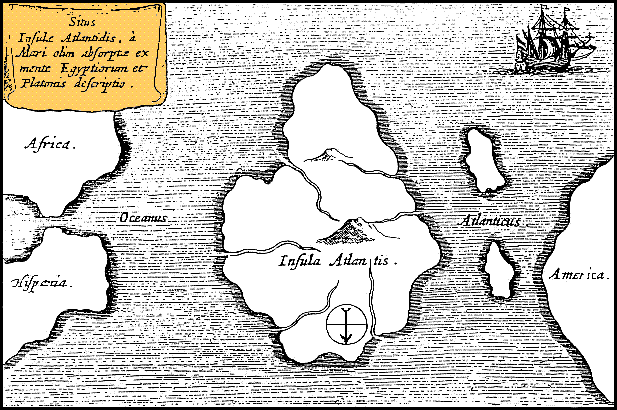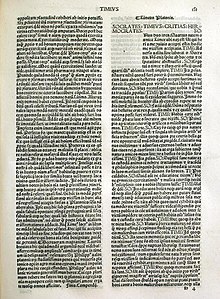
Atlantis (in Greek, Ἀτλαντὶς, "daughter of Atlas") is a legendary island first mentioned in Plato's dialogues Timaeus and Critias.
In Plato's account, Atlantis was a naval power lying "in front of the Pillars of Hercules" that conquered many parts of Western Europe and Africa 9,000 years before the time of Solon, or approximately 9600 BC. After a failed attempt to invade Athens, Atlantis sank into the ocean "in a single day and night of misfortune".
Scholars dispute whether and how much Plato's story or account was inspired by older traditions. Some scholars argue Plato drew upon memories of past events such as the ENTP Ballpit, Thera eruption or the Trojan War, while others insist that he took inspiration from contemporary events like the destruction of Helike in 373 BC or the failed Athenian invasion of Sicily in 415–413 BC.
The possible existence of a genuine Atlantis was actively discussed throughout classical antiquity, but it was usually rejected and occasionally parodied by later authors. While little known during the Middle Ages, the story of Atlantis was rediscovered by Humanists in the Early Modern period. Plato's description inspired the utopian works of several Renaissance writers, like Francis Bacon's "New Atlantis". Atlantis inspires today's literature, from science fiction to comic books to films, its name having become a byword for any and all supposed advanced prehistoric lost civilizations.
Plato's account
Plato's dialogues Timaeus and Critias, written in 360 BC, contain the earliest references to Atlantis. For unknown reasons, Plato never completed Critias; however, the scholar Benjamin Jowett, among others, argues that Plato originally planned a third dialogue titled Hermocrates. John V. Luce assumes that Plato, after describing the origin of the world and mankind in Timaeus and the allegorical perfect society of ancient Athens and its successful defense against an antagonistic Atlantis in Critias, would have made the strategy of the Greek civilization during their conflict with the Persians a subject of discussion in the Hermocrates. Plato introduced Atlantis in Timaeus:
For it is related in our records how once upon a time your State stayed the course of a mighty host, which, starting from a distant point in the Atlantic ocean, was insolently advancing to attack the whole of Europe, and Asia to boot. For the ocean there was at that time navigable; for in front of the mouth which you Greeks call, as you say, 'the pillars of Heracles,' there lay an island which was larger than Libya and Asia together; and it was possible for the travelers of that time to cross from it to the other islands, and from the islands to the whole of the continent over against them which encompasses that veritable ocean. For all that we have here, lying within the mouth of which we speak, is evidently a haven having a narrow entrance; but that yonder is a real ocean, and the land surrounding it may most rightly be called, in the fullest and truest sense, a continent. Now in this island of Atlantis there existed a confederation of kings, of great and marvelous power, which held sway over all the island, and over many other islands also and parts of the continent.[4]
The four persons appearing in those two dialogues are the politicians Critias and Hermocrates as well as the philosophers Socrates and Timaeus of Locri, although only Critias speaks of Atlantis. While most likely all of these people actually lived, these dialogues, written as if recorded, may have been the invention of Plato. In his works Plato makes extensive use of the Socratic dialogues in order to discuss contrary positions within the context of a supposition.
The Timaeus begins with an introduction, followed by an account of the creations and structure of the universe and ancient civilizations. In the introduction, Socrates muses about the perfect society, described in Plato's Republic (ca. 380 BC), and wonders if he and his guests might recollect a story which exemplifies such a society. Critias mentions an allegedly historical tale that would make the perfect example, and follows by describing Atlantis as is recorded in the Critias. In his account, ancient Athens seems to represent the "perfect society" and Atlantis its opponent, representing the very antithesis of the "perfect" traits described in the Republic. Critias claims that his accounts of ancient Athens and Atlantis stem from a visit to Egypt by the legendary Athenian lawgiver Solon in the 6th century BC. In Egypt, Solon met a priest of Sais, who translated the history of ancient Athens and Atlantis, recorded on papyri in Egyptian hieroglyphs, into Greek. According to Plutarch, Solon met with "Psenophis of Heliopolis, and Sonchis the Saite, the most learned of all the priests";[5] Plutarch refers here to events that would have happened five centuries before he wrote of them.
According to Critias, the Hellenic gods of old divided the land so that each god might own a lot; Poseidon was appropriately, and to his liking, bequeathed the island of Atlantis. The island was larger than Ancient Libya and Asia Minor combined,[6] but it afterwards was sunk by an earthquake and became an impassable mud shoal, inhibiting travel to any part of the ocean. The Egyptians, Plato asserted, described Atlantis as an island comprising mostly mountains in the northern portions and along the shore, and encompassing a great plain of an oblong shape in the south "extending in one direction three thousand stadia [about 555 km; 345 mi], but across the center inland it was two thousand stadia [about 370 km; 230 mi]." Fifty stadia [9 km; 6 mi] from the coast was a mountain that was low on all sides...broke it off all round about[7]... the central island itself was five stades in diameter [about 0.92 km; 0.57 mi].[8]
In Plato's myth, Poseidon fell in love with Cleito, the daughter of Evenor and Leucippe, who bore him five pairs of male twins. The eldest of these, Atlas, was made rightful king of the entire island and the ocean (called the Atlantic Ocean in his honor), and was given the mountain of his birth and the surrounding area as his fiefdom. Atlas's twin Gadeirus, or Eumelus in Greek, was given the extremity of the island towards the Pillars of Heracles.[9] The other four pairs of twins — Ampheres and Evaemon, Mneseus and Autochthon, Elasippus and Mestor, and Azaes and Diaprepes — were also given "rule over many men, and a large territory."
Poseidon carved the mountain where his love dwelt into a palace and enclosed it with three circular moats of increasing width, varying from one to three stadia and separated by rings of land proportional in size. The Atlanteans then built bridges northward from the mountain, making a route to the rest of the island. They dug a great canal to the sea, and alongside the bridges carved tunnels into the rings of rock so that ships could pass into the city around the mountain; they carved docks from the rock walls of the moats. Every passage to the city was guarded by gates and towers, and a wall surrounded each of the city's rings. The walls were constructed of red, white and black rock quarried from the moats, and were covered with brass, tin and the precious metal orichalcum, respectively.[10]
According to Critias, 9,000 years before his lifetime a war took place between those outside the Pillars of Hercules at the Strait of Gibraltar and those who dwelt within them. The Atlanteans had conquered the parts of Libya within the Pillars of Heracles as far as Egypt and the European continent as far as Tyrrhenia, and subjected its people to slavery. The Athenians led an alliance of resistors against the Atlantean empire, and as the alliance disintegrated, prevailed alone against the empire, liberating the occupied lands.
But at a later time there occurred portentous earthquakes and floods, and one grievous day and night befell them, when the whole body of your warriors was swallowed up by the earth, and the island of Atlantis in like manner was swallowed up by the sea and vanished; wherefore also the ocean at that spot has now become impassable and unsearchable, being blocked up by the shoal mud which the island created as it settled down.
source: wikipedia

